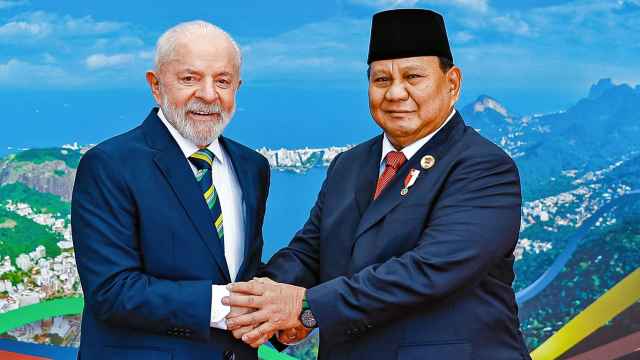U.S. President Barack Obama's foreign policy landscape is littered with deflated balloons. Soaring speeches, high hopes and great expectations have yielded minimal returns. Across the Islamic world, from North Africa to Iraq, Afghanistan and Pakistan, we see fragile relationships, unhappy transitions, unresolved conflicts and outright attacks on the United States, despite Obama's case for a new beginning. Israel, deaf to Obama's urging, is farther from reconciliation with the Palestinian Authority and closer to war with Iran than it has ever been. But the balloon that has deflated the most may be the one that Obama sent aloft in Prague in April 2009, when he made the case for rapid and serious movement toward a world free of nuclear weapons.
A good start was made with the New START treaty to limit significantly strategic-weapon deployments, the largely successful Nuclear Nonproliferation Treaty Review Conference, and the productive, U.S.-hosted Nuclear Security Summit. But over the past year, the spirit of optimism that energized these developments has, sadly, gone missing.
Apart from another reasonably productive Nuclear Security Summit in Seoul in March, the news on the disarmament front over the past year has certainly been bleak. Further U.S.-Russian arms-reduction negotiations ground to a halt long before the U.S. presidential election season began. Meanwhile, no other nuclear-armed state has expressed the slightest interest in bilateral or multilateral reduction negotiations until the two major powers, which currently hold 95 percent of the world's stockpile, make further major cuts.
Cautious initial moves by the U.S. to modify its nuclear doctrine — toward accepting that nuclear weapons' "sole purpose" is to respond to nuclear threats — have gone nowhere. Negotiations to "dealert" the 2,000 nuclear weapons that remain at absurdly dangerous Cold War-era launch readiness have never really started.
There are also no signs of movement on bringing into force the Comprehensive Nuclear Test Ban Treaty. In addition, there has been zero progress on breaking the negotiating stalemate on a new treaty to ban production of fissile material for nuclear weapons, and there has been negligible progress on a conference to create a nuclear-weapons-free zone in the Middle East. Meanwhile, India, Pakistan and China are accelerating their nuclear-weapons programs.
So who is to blame? Some charge the Obama administration itself with sending mixed signals or worse: The U.S., they note, has modernized its nuclear arsenal, developed new missile defense and conventional weapons systems and has been too willing to accommodate its European and northeast Asian allies' nervousness about limiting the nuclear dimension of the extended deterrence umbrella under which they shelter.
But it is hard to ignore the huge constraint that an intensely partisan and negative political environment in the U.S. has imposed. Republican intransigence has precluded U.S. ratification of the nuclear test ban treaty, almost killed the New START treaty at birth and has caused the bar for further negotiations with Russia and China to be set almost impossibly high. Nor is there any sign that any of these positions would be modified should Mitt Romney, the Republican challenger, become president. International concerns have been compounded by the shrillness of Romney's statements on China and Taiwan, as well as his extraordinary identification of Russia as the United States' "No. 1 geopolitical foe."
Some say it is naive to believe that a nuclear-free world can be achieved. But it is not naive to be concerned about the most indiscriminately inhumane weapons of destruction ever invented, 23,000 of which still exist, with a combined destructive capability of 150,000 Hiroshima bombs.
The genuinely naive — or ignorant — position is to believe that statesmanship and foolproof controls, rather than sheer dumb luck, have enabled the world to go almost seven decades without a nuclear-weapons catastrophe. It is not naive to believe that nuclear deterrence is both fragile operationally and of thoroughly dubious utility in sustaining the peace. Nor is it naive to believe that even if nuclear weapons cannot be uninvented, they can ultimately be outlawed.
Obama cannot be faulted for trying. Even deflated balloons are better than a devastated planet.
Gareth Evans, former Australian foreign minister, co-chaired the International Commission on Nuclear Nonproliferation and convenes the Asia Pacific Leadership Network. © Project Syndicate
Related articles:
A Message from The Moscow Times:
Dear readers,
We are facing unprecedented challenges. Russia's Prosecutor General's Office has designated The Moscow Times as an "undesirable" organization, criminalizing our work and putting our staff at risk of prosecution. This follows our earlier unjust labeling as a "foreign agent."
These actions are direct attempts to silence independent journalism in Russia. The authorities claim our work "discredits the decisions of the Russian leadership." We see things differently: we strive to provide accurate, unbiased reporting on Russia.
We, the journalists of The Moscow Times, refuse to be silenced. But to continue our work, we need your help.
Your support, no matter how small, makes a world of difference. If you can, please support us monthly starting from just $2. It's quick to set up, and every contribution makes a significant impact.
By supporting The Moscow Times, you're defending open, independent journalism in the face of repression. Thank you for standing with us.
Remind me later.





